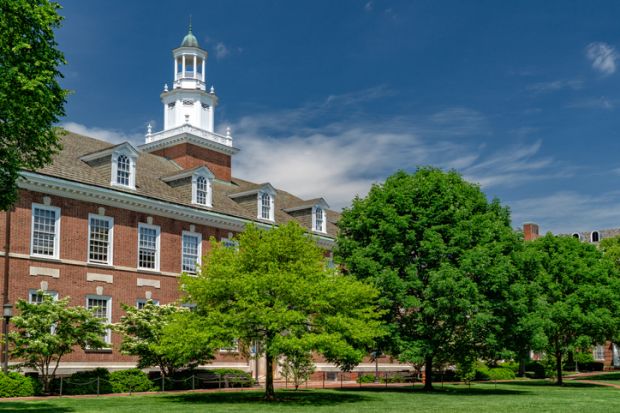US universities may be more cautious about establishing branch campuses in India than their British and Australian counterparts, academics have said, as the Delhi government discusses the prospect with a leading American institution.
A delegation from Johns Hopkins University (JHU) met with Indian education minister Dharmendra Pradhan in November to talk about academic and research collaboration opportunities, including setting up a campus.
In a statement, the Indian Ministry of Education said the delegation “actively discussed establishing an offshore JHU campus in India”.
An unnamed senior official told The Times of India: “Given the keen interest expressed by [the] high-level delegation during the meeting, [the] government is hopeful of a positive outcome very soon.”
JHU, a private university, already has offshore campuses in Italy and China, as well as the Gupta-Klinsky India Institute at its home campus. But a spokesman told Times Higher Education that the institution had no plans for a physical presence in India at the moment.
In November 2023, India released guidelines setting out how foreign institutions can establish branch campuses in the country. Overseas universities had already been invited to open campuses in Gift City, a special economic zone in Gujarat.
Since then two Australian institutions have moved into Gift City, with British universities expected to follow. Earlier this year, the University of Southampton also announced plans to establish a comprehensive campus on the outskirts of Delhi.
However, academics were sceptical that many US universities will follow suit, believing they may be more risk averse.
“I’m not surprised that US institutions have not immediately leapt to set up a branch,” said Jason Lane, a special adviser to the president at University of Illinois System and a branch campus expert.
“Unlike the international branch campus gold rush we saw about a decade or more ago, we have seen a slowdown in the establishing of international branch campuses globally as institutions move more cautiously due to rapidly shifting economic and geopolitical dynamics.”
“The top institutions are going to be quite slow because operating in India is not easy,” added Philip Altbach, professor emeritus at Boston College’s Centre for International Higher Education.
A major barrier for US public institutions was restrictions on spending money abroad, particularly on infrastructure. “Even where they’re not forbidden, I think they’re quite averse to doing that,” said Professor Altbach, adding that this was less of a concern for British and Australian institutions.
Some Gulf countries have historically offered funding and tax breaks to encourage foreign universities to move in, but no such incentives are on offer across most of India.
However, top US institutions have been active in setting up research centres in India and developing partnerships with domestic institutions.
“These sorts of activities allow institutions to gain experience working in India and build their local reputation, which will be helpful should they decide to move forward with establishing a full-fledged branch campus,” said Dr Lane.
Later, a Johns Hopkins spokesman said: “Johns Hopkins deeply values our enduring partnerships in India, and we’re excited about the opportunities for ongoing collaborations, which can take many forms, including the research, health initiatives, and educational opportunities for our students that we’ve announced and explored on this trip. Right now, we are focused on those areas, and do not have specific plans for an expanded physical presence in the country.”
Register to continue
Why register?
- Registration is free and only takes a moment
- Once registered, you can read 3 articles a month
- Sign up for our newsletter
Subscribe
Or subscribe for unlimited access to:
- Unlimited access to news, views, insights & reviews
- Digital editions
- Digital access to THE’s university and college rankings analysis
Already registered or a current subscriber?








